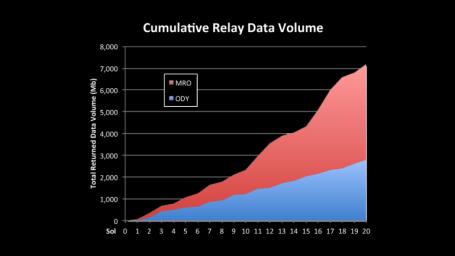
|
Curiosity Speaks Volumes
- Click the image above for a larger view
- Full-Res JPEG (1280 x 720) (54.4 kB)
- Full-Res TIFF (1280 x 720) (2.8 MB)
Caption:
This chart shows increases in the volume of data coming back from NASA's Mars rover Curiosity over recent sols, or Martian days. The rover has the ability to talk directly to Earth, but its data can be relayed faster, and in larger quantities, with the help of orbiters, including NASA's Mars Reconnaissance Orbiter (MRO) and NASA's Odyssey.
New capabilities of the "Electra" relay-radios on MRO and Curiosity, including higher available data rates and a new capability in which the data rate is optimally varied throughout the relay pass, have greatly increased the volume of data the rover is sending back from Mars.
Background Info:
JPL manages the Mars Science Laboratory/Curiosity for NASA's Science Mission Directorate in Washington. The rover was designed, developed and assembled at JPL, a division of the California Institute of Technology in Pasadena.
For more about NASA's Curiosity mission, visit: http://www.jpl.nasa.gov/msl , http://www.nasa.gov/mars , and http://marsprogram.jpl.nasa.gov/msl .
Cataloging Keywords:
| Name | Value | Additional Values |
|---|---|---|
| Target | Mars | |
| System | ||
| Target Type | Planet | |
| Mission | Mars Science Laboratory (MSL) | Mars Reconnaissance Orbiter (MRO) |
| Instrument Host | Curiosity Rover | Mars Reconnaissance Orbiter |
| Host Type | Rover | Orbiter |
| Instrument | ||
| Detector | ||
| Extra Keywords | Color | |
| Acquisition Date | ||
| Release Date | 2012-08-27 | |
| Date in Caption | ||
| Image Credit | NASA/JPL-Caltech | |
| Source | photojournal.jpl.nasa.gov/catalog/PIA16107 | |
| Identifier | PIA16107 | |
